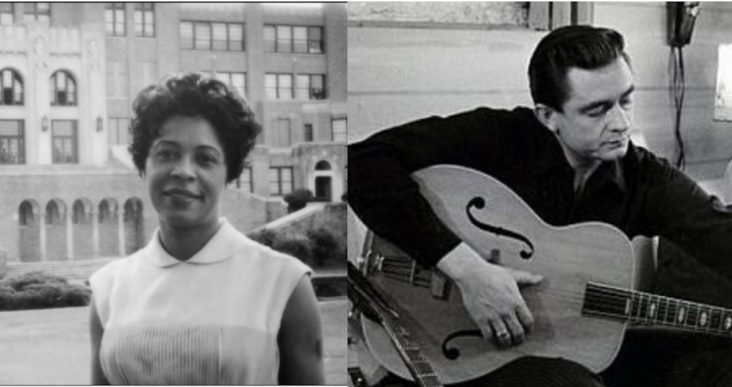More than $500,000 raised for Daisy Bates, Johnny Cash statues
by November 12, 2020 4:51 pm 2,124 views

Arkansas is poised to change its sculptures in the National Statuary Hall Collection in the U.S. Capitol. Gov. Asa Hutchinson said Thursday (Nov. 12) the two statues in the Hall, those of U.M. Rose and James P. Clarke, will be replaced with civil rights icon Daisy Gatson Bates and hall-of-fame musician Johnny Cash.
About $510,000 has been raised to construct the new sculptures, he said.
A push began by State Sen. Dave Wallace R-Leachville, and State Rep. Jeff Wardlaw, R-Hermitage, during the last legislative session to replace Rose and Clarke with Bates and Cash. At least a dozen Arkansans were considered for the honor, but legislators settled on these two. A timetable for replacing the statues has not been released.
“We want to talk today about how we are represented as a state in the halls of Congress … in the last 100 years Arkansas has changed as a state, but it’s not represented in Statuary Hall,” Hutchinson said.
Cash will be the first musician in the Hall. His statue will be placed in the Hall Visitor Center, National Statuary Hall Steering Committee Chairman Shane Broadway said. Bates will be placed next to a statue of Confederate President Jefferson Davis and adjacent to another civil rights icon Rosa Parks. The committee has worked for about a year with the families and officials with the Hall to place and construct the statues.
“This is an historic event for the state,” Broadway said.
The U.S. Congress authorized the creation of the Hall in 1864 and each state is allowed two statues. Up to 5 million people from around the world visit the Hall each year.
DAISY BATES
Bates, who would have turned 106 a day before the announcement, is considered a pillar in the Arkansas civil rights movement. She, along with her husband, Lucious Christopher (L.C.) Bates, started the weekly newspaper, the Arkansas State Press, in 1941. It would become the largest African-American newspaper in the state and focused on journalism related issues. It had a statewide reach, distributing in cities such as Little Rock, Pine Bluff, Texarkana, Helena, Forrest City, and Jonesboro.
The State Press ran stories that spotlighted the achievements of black Arkansans as well as social, religious, and sporting news. The eight-page paper was published on Thursdays, carrying a Friday dateline, according to the Encyclopedia of Arkansas. It routinely noted incidents of racial injustice, a rarity for the time.
The newspaper’s staunch positions in favor of civil rights progress from the Brown vs. Topeka Board of Education decision to the Little Rock desegregation crisis in 1957 often led to white advertisers abandoning the newspaper. It wasn’t until the 1960s that white-owned newspapers began to write about the injustices brought against African Americans in the South.
JOHNNY CASH
Cash grew up in the Dyess Colony in Northeast Arkansas during the 1930s and 1940s. During that era, the area was more swamp than usable farm ground. Workers drained the swamp and 500 farm families, including the Cash family, received 40 acres and a mule through a federal government aid program. Rice and cotton were grown. Cash, along with his brother, Jack, worked the family farm and attended school. Work in the fields was grueling. At night, Johnny and Jack spent a lot of time in their room.
Jack died in a wood cutting accident as a youth. Music historians attribute Cash’s dark, brooding style to his brother’s unexpected death. Johnny Cash served in the military after high school. He came home periodically to visit his parents. In 1956, they moved to Memphis, where he signed a music contract with Sam Phillips.
Cash, known as “The Man in Black,” would go onto have a career that would rival legends in the industry including a man he played with often in his early years, Elvis Presley. He returned to his old homestead years after he became internationally famous with songs such as “Walk the Line,” “Ring of Fire,” Folsom Prison Blues” among others.
Arkansas State University began restoring his boyhood home a decade ago and a festival is held there each year to celebrate his musical accomplishments.
U.M Rose (1834-1913) was an attorney who founded the Arkansas Bar Association and Rose Law Firm, which celebrated its 200th anniversary this year. He was appointed to serve as an ambassador during the Second Hague Peace Conference in 1907 by then President Theodore Roosevelt. James P. Clarke (1854-1916) was a former governor and a defender of white supremacy during his time as a public figure.
